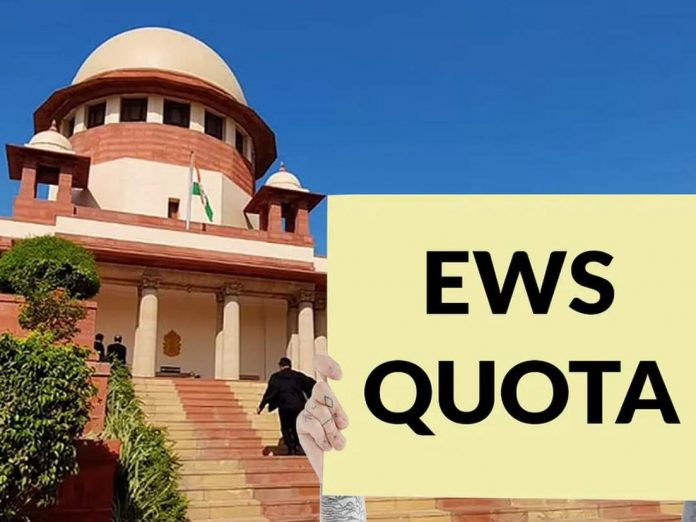Three judges upheld the 103rd amendment to the Constitution for reservation. At the same time, Chief Justice UU Lalit and Justice Ravindra Bhat gave their opinion against this reservation.
The Supreme Court has approved the reservation being given to the Economically Weaker Section (EWS). This reservation will be applicable in the future also. A five-judge bench ruled in favor of EWS reservation 3-2. Three judges upheld the 103rd amendment to the Constitution for reservation. At the same time, Chief Justice UU Lalit and Justice Ravindra Bhat gave their opinion against this reservation. Know the full verdict, which judges said what, and what did it mean?
Which judges ruled in favor and who in opposition?
Justice JB Pardiwala, Justice Dinesh Maheshwari, and Justice Bela Trivedi ruled in favor of EWS reservation. These judges considered that this reservation is not against the Constitution, but an opportunity to provide equal opportunities to all. He said that the amendment made regarding reservation is in accordance with the intention of the Constitution. At the same time, Chief Justice UU Lalit and Justice Ravindra Bhat gave their opinion against it.
What did Justice Dinesh Maheshwari say?
Justice Dinesh Maheshwari said in favor of EWS reservation, ‘We have taken care of equality. Can the economic reservation be the basis for giving economic reservation? The quota on economic grounds is not against the basic spirit of the Constitution. This in no way harms the essence of reservation. Justice Maheshwari upheld the 103rd amendment to the Constitution.
What did Justice Bela Trivedi say?
Justice Bela Trivedi also upheld the observation of Justice Maheshwari. He stated that I concur with Justice Maheshwari’s judgment. He claimed that reservations for OBC, SC, and ST already exist. It is ineligible for the broad category. Although the reservation has been in place for 75 years, the constitution’s founders had intended to maintain it in place just temporarily.
What did Justice Pardiwala say?
Justice JB Pardiwala concurred with the points raised by Justice Maheshwari and Justice Bela and said, “Reservation is not an end, it is a means, and it should not be allowed to become vested interests.” He further said, ‘The reservation should not be extended indefinitely. It is a way to benefit the people at large. That’s why I am in favor of the amendment made for the EWS reservation.
Justice Ravindra Bhat expressed dissent
While giving the decision of reservation on economic grounds, Justice Ravindra Bhat disagreed. “A major part of the population belongs to SC/ST/OBC. Many of them are poor. So the 103rd amendment is wrong. It will not be right to give more than 50 percent reservation. Articles 15(6) and 16(6) should be repealed.
Chief Justice also agreed with Justice Bhat’s decision
Chief Justice UU Lalit also opposed reservation on economic grounds. He stated that I concur with Justice Ravindra Bhat’s ruling. He said, crossing the 50 percent reservation limit is against the infrastructure. This is against the Constitution’s fundamental principles.
What is the whole matter, understand
That the central government had made the 103rd amendment in the constitution to give 10 percent reservation to the economically weaker upper castes. The Supreme Court heard a challenge to its legality. The five-judge bench had reserved the verdict on September 27. The five-judge constitution bench comprises Chief Justice UU Lalit, Justice Dinesh Maheshwari, Justice S Ravindra Bhat, Bela M Trivedi, and JB Pardiwala. The marathon hearing in the case lasted for about seven days. In this, the petitioners and (then) Attorney General KK Venugopal and Solicitor General Tushar Mehta gave their arguments regarding the EWS quota.
What did the petitioners argue?
The petitioners had argued that the purpose of reservation is the upliftment of the socially discriminated class, if poverty is the basis then SC-ST-OBC should also be given a place in it. The EWS quota is a violation of the 50 percent reservation limit.
What side did the government take?
The government also presented its side in the Supreme Court on the claims of the petitioner. It was said on behalf of the government that this system is necessary to get equality status to the EWS category. It was said on behalf of the central government that there is no harm to any other class getting reservations from this system. The 50% limit that is being mentioned is not a constitutional arrangement, it has come from a decision of the Supreme Court. In such a situation, it would be wrong to say that further reservation cannot be given.
Read More: Digital Currency: Notes will be closed in the future! RBI did a pilot test of digital currency, what will be the benefit?
|
|
 YouTube YouTube |
Click Here |
 Facebook Page Facebook Page |
Click Here |
 Instagram Instagram |
Click Here |
 Telegram Channel Telegram Channel |
Click Here |
 Google News Google News |
Click Here |
 Twitter Twitter |
Click Here |




